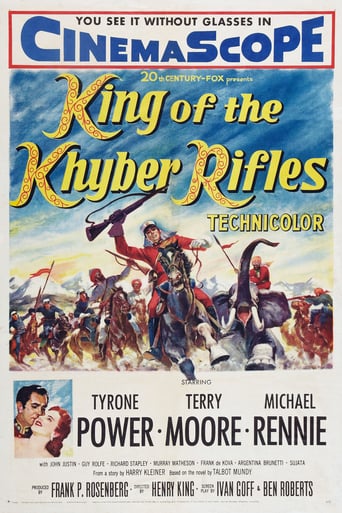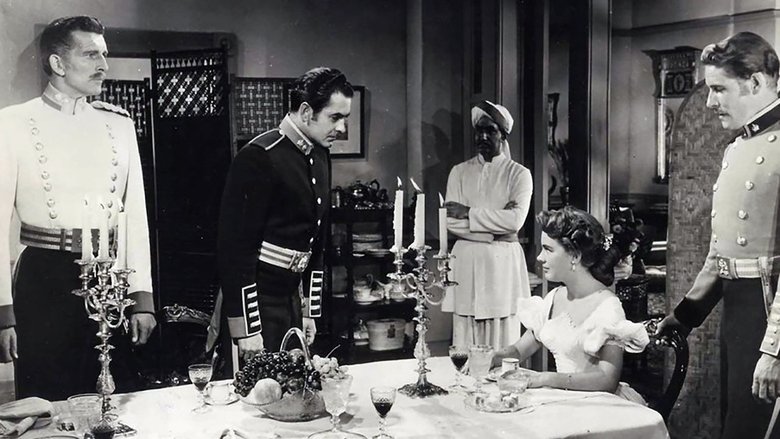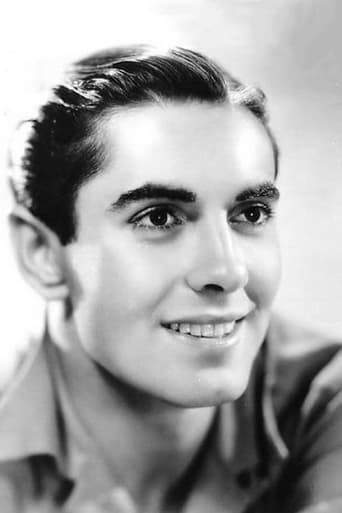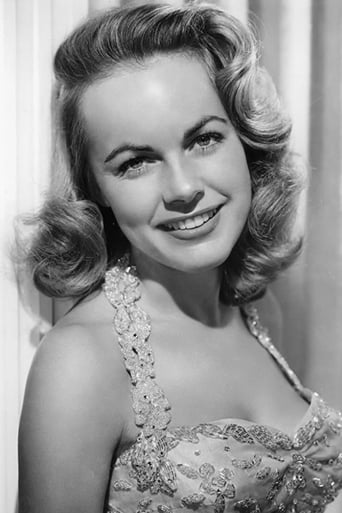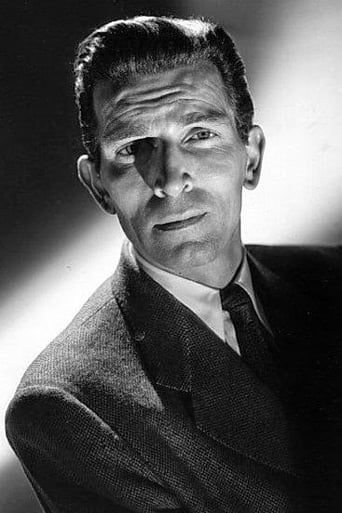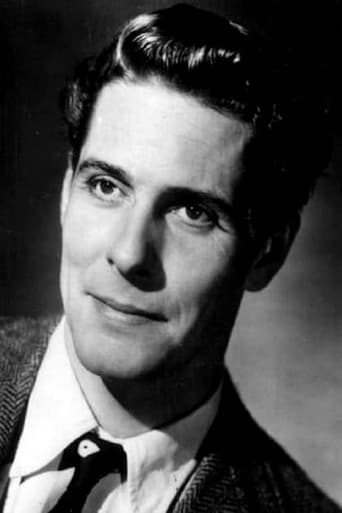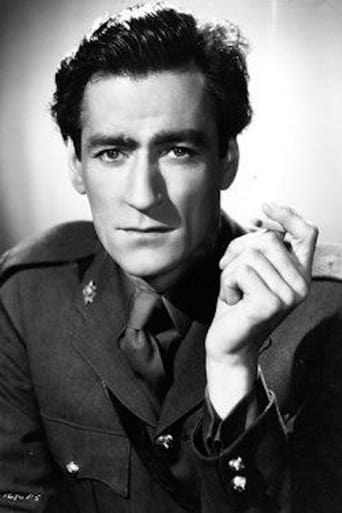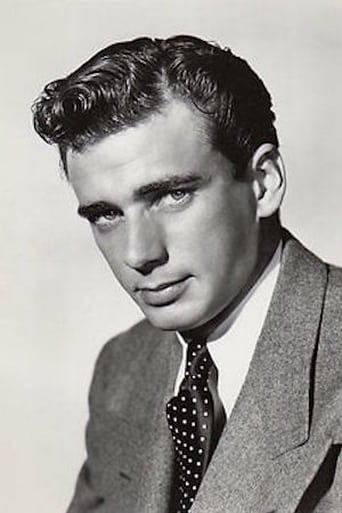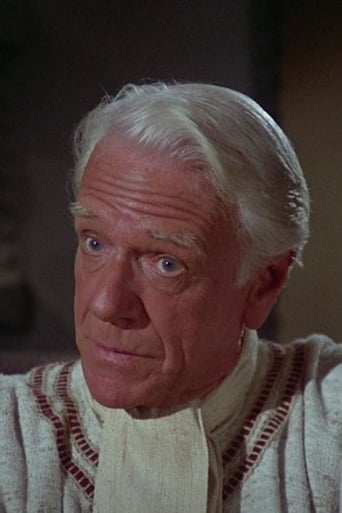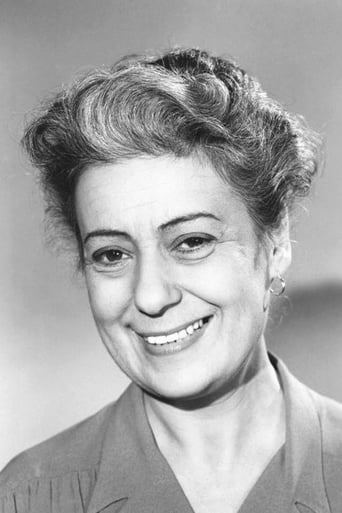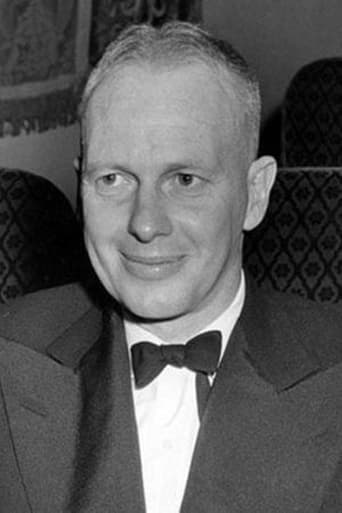Freshly arrived Sandhurst-trained Captain Alan King, better versed in Pashtun then any of the veterans and born locally as army brat, survives an attack on his escort to his Northwest Frontier province garrison near the Khyber pass because of Ahmed, a native Afridi deserter from the Muslim fanatic rebel Karram Khan's forces. As soon as his fellow officers learn his mother was a native Muslim which got his parents disowned even by their own families, he falls prey to stubborn prejudiced discrimination, Lieutenant Geoffrey Heath even moves out of their quarters, except from half-Irish Lt. Ben Baird.


Similar titles
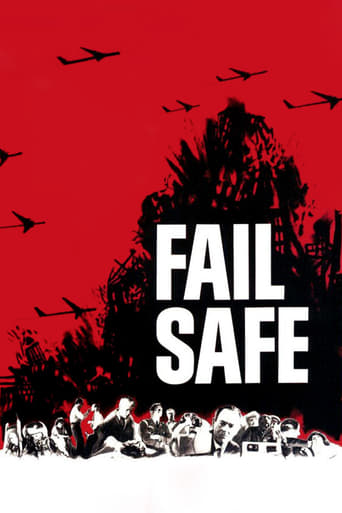
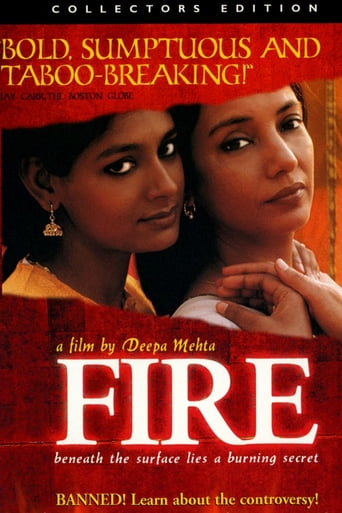
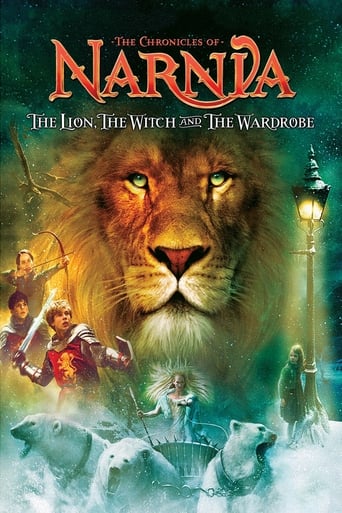
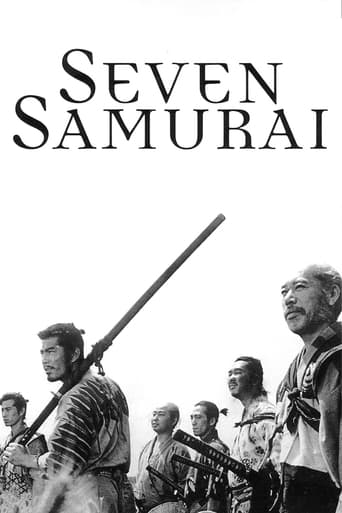
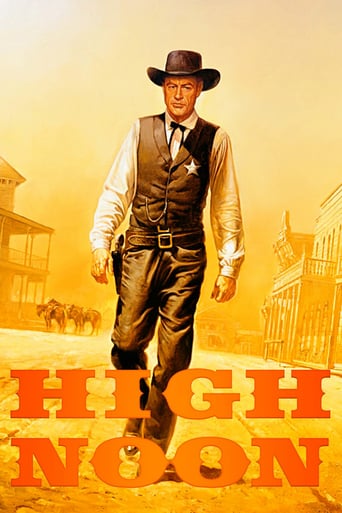
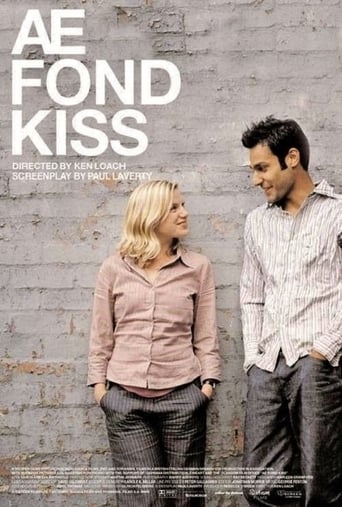
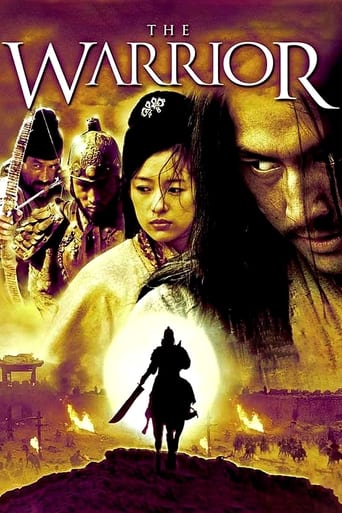
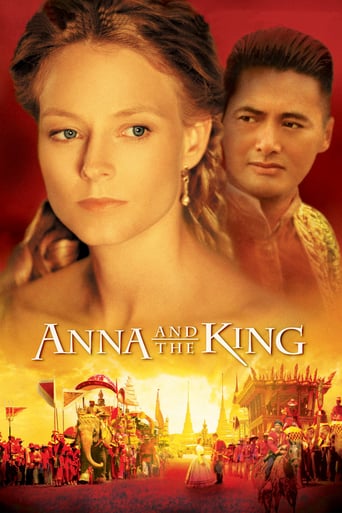
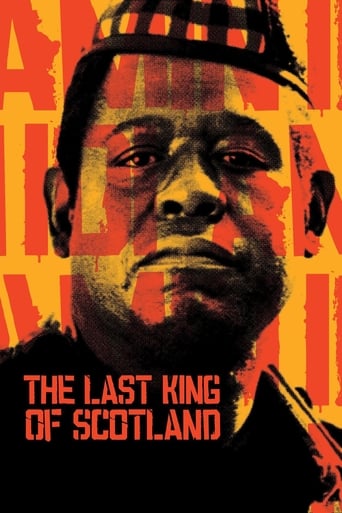
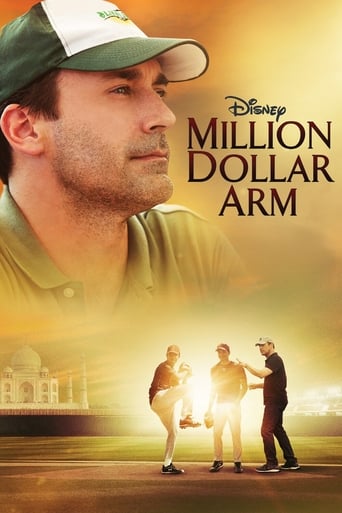
Reviews
Fox's KING OF THE KHYBER RIFLES (1953) is quite a reasonably good colourful adventure set in India in 1857. A remake of John Ford's "The Black Watch" (1929) it was based on the novel by Talbot Mundy from which derived a fairly decent screenplay by Ivan Goff and Ben Roberts. Tyrone Power was the star and once again he was reunited with his favourite director and friend Henry King in Frank Rosenberg's elaborate production. This was the studio's fourth picture filmed in the then new stunning process of Cinemascope and Stereophonic sound! The new format lending itself beautifully to the Lone Pine Californian locations which doubled perfectly for India's Northwest Frontier. And veteran expert Cinematographer Leon Shamroy seemed right at home with his creative use of the widescreen camera.Tyrone Power was Fox's top leading man in the forties but by the time the studio embarked on their wonderful Cinemascope productions in 1953 his star was beginning to wane. The actor was also tired of the usual adventure fare he was frequently thrust into by studio head Darryl Zanuck and longed to do other things in film for other companies. He wanted to break his contract (he amusingly referred to the studio as Penitentiary Fox) and turned down the lead in Fox's ambitious first scope movie "The Robe" resulting in Zanuck suspending him. But not for long! His friend and mentor Henry King came into the fray when he wanted Power to star in his first stab at Cinemascope - KING OF THE KHYBER RIFLES and would settle for no one else. So Power and Zanuck kissed and made up and the star took up the assignment."India - 1857 - the one hundredth year of British rule" reads the post credits caption on the screen at the opening of the picture. Captain Alan King and his troop are escorting some supply wagons to the Peshawar district garrison not far from the infamous Khyber Pass where rebel Kerram Khan and his army of insurgents are holed up and are preparing for "The night of the long knives" the time when India will rise up against British rule. This is the film's basic premise and depicts one man's efforts to thwart an inevitable uprising. But along the way he will fall in love with the Colonel's daughter (the totally resistible Terry Moore) and be pilloried for being the half-caste boyhood friend of the rebel leader (Guy Rolfe) who he must confront and endeavour to kill.KING OF THE KHYBER RIFLES is a good adventure yarn and looks great on the wide canvas of the Cinemascope screen (a desert rescue sequence is particularly effective). Performances are generally good too. Power, though somewhat subdued, is fine as the troubled Captain King and Michael Rennie gives his usual smooth turn as the authoritative commanding officer. Charismatic British actor Guy Rolfe is superb as Karram Khan. Rolfe an actor with loads of screen presence never followed this up with anything worthwhile and became just another working actor mostly on television. He died back in England in 2003 at the age of 91. Now, the part of the leading lady is the picture's major fault! Terry Moore is completely miscast! To begin with she simply doesn't suit Tyrone Power at all! She's too young for him! Plus she's supposed to be an English girl raised and schooled in England but instead she just looks and sounds like an American High School student who discovers she has a crush on her history professor. Her casting here is almost identical to that of four years earlier when the equally resistible Wanda Hendricks was Power's leading lady in "Prince Of Foxes". What on earth was wrong with Ty? He seemed to have problems selecting an appropriate leading lady! HUH!However a huge plus for the movie is the remarkable music by Bernard Herrmann! A rollicking eastern tinged Main Title with bravura brass fanfares and augmented timpani opens the score. There is some eerie music for the Hammer Of God scene and a ravishing love theme for the picture's softer moments which the composer fashions into a beautiful waltz for the Queen's Birthday Ball sequence. Alongside "Beneath The 12 Mile Reef" (1953) KING OF THE KHYBER RIFLES is Herrmann's best adventure score!If you can overlook the presence of Terry Moore (think Susan Hayward or Jean Peters) KING OF THE KHYBER RIFLES is an engaging 100 minutes of entertainment. But why is this movie not on DVD? As far as I know it isn't even on Video tape! What is wrong with Fox Home Entertainment? They seem to have forgotten Ty Power in "Untamed" (1955) as well! In fact they seem to have totally forgotten what remains in their back catalogue! Where's "Seven Cities of Gold" (1955 / with a riveting performance from Michael Rennie), "Violent Saturday" (1955) and "Rio Conchos" (1964)? Who knows?? Anyone??
The idea for a story about boyhood friends who find themselves on opposite sides of the Indian Mutiny is a promising one; make one of them a half-caste officer on whom the commandant's wilful daughter has set her sudden fancy, much to the agonies of her father's would-be liberal conscience, and you ought to have a powerful picture.Sadly, "King of the Khyber Rifles" isn't that film.The potentially interesting theme of the conflicts of loyalty between the warlord Karram Khan, his father who has turned to pacifism, and his foster-brother Charles King is barely touched upon, and then only in a cursory manner as a plot mechanism. When, returning to camp, Captain King is arrested under suspicion of being in league with the rebels, an accusation circumstances have conspired to render all too probable... the whole careful set-up is disregarded the moment said rebels actually attack. In fact, King is instantly released and entrusted with leading an undercover attack against these same rebels! The film is much more interested in its racially-conscious romantic subplot than in any conflicts of loyalty, but the romance unfortunately falls pretty flat for me. As mentioned by other reviewers, Terry Moore -- so charming opposite an SFX gorilla in "Mighty Joe Young" -- here plays the role of Susan as a Valley Girl airhead with anachronistic attitudes, while I found it hard to see why she instantly hurls herself at the head of Tyrone Power, who appears to participate in the entire film with polite but wooden reluctance. There is so little screen chemistry on view between them that when she comes bursting into King's bedroom at night to confess her passion -- an act, for a lady of 1857, that would have compromised her honour as effectively as actually sleeping with him -- I rather expected the embarrassed Captain to repulse her gently on the grounds that he simply did not return her feelings.Nor do the racial politics seem particularly well thought-out. British India, even the Northwest Frontier, was not the American Deep South, where the higher the admixture of white blood the better; the 'chi-chi' was looked down upon by the Indian as by the Englishman, a fact correctly acknowledged in the film by King's mother's ostracism, but not in the plot assumption that his own half-blood status gives him an edge with "them". And the argument he uses on his rebellious men, that if he can honourably bite the cartridges so can they, makes little sense unless he also shares their religion and hence the taboo -- which, to all appearances, he does not.But all this could be ignored; my real problem with this film was that it failed to engage or excite me, save for that one justly famous moment when the captured soldiers are dispatched one by one, transfixed by the horsemen's spears. Watching approaching death, Tyrone Power's face conveys emotion at last -- but the moment passes, and film and star alike go through the motions until the end.Given its material, this could have been a great picture. As it turns out, it's just another genre entry, and a somewhat cursory one at that. The star's heart doesn't seem to be in it, and neither script nor action hold any great sparkle to compensate.
While offering many racist undercurrents in portraying imperialism and eastern characters, adventure movies have long satisfied a desire for escape, becoming one of the principal avenues for presenting views of foreign cultures (however warped) and distant lands to curious and receptive audiences. The genre is sufficiently flexible to allow for only a lukewarm endorsement of colonialism or questioning of its political effects, a tradition going back at least to 1928 and the notable production of WHITE SHADOWS OVER THE SOUTH SEAS. However, this theme only became established after World War II, as films began to reflect the crumbling of western empires in Africa and Asia and recognition grew of the pernicious effects of imperialism and its attendant racism. The first major film signpost of these changes was KING OF THE KHYBER RIFLES (1953), set in the Sepoy Mutiny of 1857, a conflict that had rarely been treated in films up to that time. The story centers on a character of Eurasian ancestry, Captain Alan King (Tyrone Power), who falls in love with an English girl, Susan (Terry Moore), the daughter of the outpost's commander, General Maitland (Michael Rennie)--providing an opportunity for exploring racial attitudes in a colonial setting. Focusing on a relationship between a half-caste and a white girl was, in the early 1950s, an original cinematic theme, and KING OF THE KHYBER RIFLES was unique for presenting it in adventure.KING OF THE KHYBER RIFLES explores King's personal difficulties as he tries to find his own social position, living in uneasy suspension between the world of the native and the foreign sahibs, torn between them; only the adventurous experience can resolve his status. Prejudice against King emerges because of his parentage; fellow officers refuse to be billeted in the same quarters, and he is conspicuously not invited to the queen's birthday ball. The stress is not simply on his courage but more on the numerous challenges he must face in daily living. A social outcast at the fort, King is most secure in the home of his adopted father, Hamid Bahra, a Moslem holy man; the picture was originally to end with King returning to Bahra before joining Susan. KING OF THE KHYBER RIFLES has a lone hero and none of the emphasis on military camaraderie, or the careless, Boys' Own tone to be found in such films as GUNGA DIN. Authentic details of Indian atmosphere convey a sense of accuracy, such as the rumors that the cartridges for the new Enfield rifles are greased with pig's fat, simultaneously offending Moslem and Hindu alike. King must use his unique appeal as a fellow native to lead the Khyber Rifles in an attack on Khan's encampment. At the last moment, King's men resolve not to use the rifles but offer to follow him using their knives. The imperial conflict is between men who are sons of India, whether Kurram Khan and his followers or King and the Khyber Rifles. Yet KING OF THE KHYBER RIFLES ultimately evades the question of the desire for Indian independence, through depicting Kurram Khan's leadership as far more ruthless and dictatorial than British rule. King is in a unique position; his half-caste status, negotiating between British and Indian with a knowledge of both, enables a British victory, establishing not just his equality within the fort but also his eligibility to marry Susan. The British outpost offers the hero the only world where his merits can win recognition, partaking of both sides of his ancestry by following in his father's military footsteps. King's birthplace and home are India, not England, and though he may serve the British, he does so for the distinction such duty may bring through association with a respected unit like the Khyber Rifles. King secures greater respect than is accorded to white officers like Maitland. While utilizing many of the incidents and motifs of THE LIVES OF A BENGAL LANCER, THE CHARGE OF THE LIGHT BRIGADE, GUNGA DIN, and other such movies, KING OF THE KHYBER RIFLES also sums them up, providing both a commentary and a decisive new turn. KING OF THE KHYBER RIFLES brings Indians to the forefront, honoring the native traditions while still treating heroes and villains according to standardized genre patterns. While clearly an adventure of colonial India in the classical mode, KING OF THE KHYBER RIFLES represents a fundamental shift to an awareness of its own conventions, allowing the film to be watched today more easily than many other adventures of a similar vintage. KING OF THE KHYBER RIFLES was the fourth picture shot in Twentieth Century-Fox's new widescreen process, CinemaScope, and it was widely acclaimed as the the first picture whose action fully justified use of the anamorphic lens. Fox's directing "King" was assigned to it: Henry King, a sixty-seven year old veteran whose career stretched back to the teens, and was a personal favorite of Zanuck as well as a close friend of leading star Tyrone Power. Power, tired of playing action roles, disliked KING OF THE KHYBER RIFLES, and by then was more interested in unusual, challenging character roles. Unfortunately, Zanuck wanted to use Terry Moore, who was already under contract, as the leading lady, a role she sought assiduously despite being completely miscast in the part. Zanuck was enthusiastic about shooting KING OF THE KHYBER RIFLES in Lone Pine, and Henry King agreed that a location trip to India was unnecessary, and the California locale substituted so well that many reviewers believed that at least portions of the picture had been shot in India. Producer Frank Rosenberg selected Bernard Herrmann to write the score, hoping for and receiving something more exotic and less intrusive than the type of martial music Alfred Newman had written for previous Henry King-Tyrone Power adventure films at Fox. KING OF THE KHYBER RIFLES was widely touted as Fox's Christmas release, becoming a box-office hit, and it is still popular on television.
Quite a few of those machine-tooled early CinemaScope productions from Twentieth Century Fox seem to be consigned to the dustbins of the memories of those of us who had the good fortune to see them in their full widescreen ratio with a magnetic stereophonic soundtrack during their initial release.This one, directed with unusual energy by that Hollywood veteran, Henry King; lensed by that master of the color cameras, Leon Shamroy; and graced with a suitably sweeping score by Bernard Herrmann, looks like its lost in the archives where, let us hope, the master negative survives until the day that keepers of the Twentieth vaults come to their senses and favor us with a DVD release in the original (not reduced to anything less, please!) widescreen anamorphic format.Terry Moore, who enjoyed a brief run as one of Fox's oft-used ingenues (and ladies of somewhat easier virtue, as in "Peyton Place") did seem a bit miscast, but Tyrone Power, Michael Rennie and well-chosen supporting players outshone her shortcomings. I recall that TIME magazine gave this quite a positive review and I remember that its use of mountainous California locations were quite convincing as a substitute for sending a company (or just a second unit) all the way to India's probably less hospitable subcontinent.
